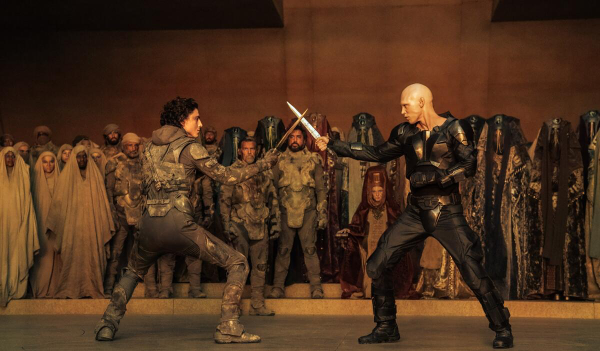“Blockbuster” Review: A Block-Bust
Minor Spoilers Ahead
Throughout the 1990s and early 2000s, Blockbuster was the go-to video rental service. Through the assistance of investment groups and eventual Viacom ownership, Blockbuster was able to expand its horizons from a solo store in Texas to an international conglomerate. At its peak, the video-rental giant boasted a total of 9000 stores worldwide, reaching a market value of $5 billion. However, the advent of Netflix, with their pioneering DVD-subscription service and eventual streaming platform that brought forth many similar services, signaled the end for the once powerful retail service.
Fast forwarding to present day, in what probably counts as corporate spite, Netflix turns to its vanquished rival as the subject for its new workplace-comedy series, simply titled “Blockbuster.” Created by Vanessa Ramos, known for her work with shows “Brooklyn Nine-Nine” and “Mr. Mayor,” this new series takes viewers to a Blockbuster store in Michigan in the immediate aftermath of the corporation’s collapse. Timmy Yoon (Randall Park) struggles to keep the store alive as a small business, all the while keeping together his crew of workers: Eliza (Melissa Fumero), Carlos (Tyler Alvarez), Connie (Olga Merediz), and Hannah (Madeleine Arthur).
Every good workplace comedy should take advantage of its unique setting, and “Blockbuster” does a decent job of utilizing its movie-based setting. Film and television references are littered across the series, with the pilot episode’s opening alone containing allusions to “Independence Day,” “Smallville,” “Ferris Bueller’s Day Off,” and “Eternal Sunshine of the Spotless Mind.” None of these allusions feel too hamfisted, which is aided by some of the characters’ unique connection to cinema, with Carlos and Timmy being the most noteworthy. Carlos is an aspiring filmmaker who learned to speak English through viewing movies and reading reviews, yet he struggles to pursue that dream due to the limitations of being the child of immigrants. Timmy worked through his parents’ divorce by watching movies and his desire to build a cohesive family is tied to his desire to work at Blockbuster.
However, while Carlos and Timmy possess conceptually interesting angles to analyze, some of the other characterizations feel slightly generic. Connie mostly represents the old goof archetype, a trait that can wear itself thin, especially during the seventh episode, “Intimate Angels.” Hannah is mostly characterized as the kindhearted simpleton, which like her spending habits, is quite cheap. Lastly, and most notably, Eliza is basically an inferior carbon copy of another Melissa Fumero character, Amy Santiago, in that both are over-achievers with relationship troubles who are overqualified for their current job. While none of these characterizations are unbearable, the jokes that result from them do not land as they should, especially since some of these same tropes are done better in other shows.
Speaking of carbon copies, the romantic dynamic between Timmy and Eliza is unoriginal. To summarize it in one sentence: guy holds long-time crush on female coworker, but has trouble expressing it as a result of her existing romantic connections. If that sounds familiar, it’s because it is the same romantic narrative featured in many other workplace sitcoms, such as “The Office” and “Brooklyn Nine-Nine.” The entire dynamic has a “been there-done that” vibe, and is only made worse by the fact that every action made by Timmy (the main character) boils down to this retreaded storyline, regardless of the episode. It detracts from the show’s premise of being the last of a dying age, as the attraction is not even tied to their history of working at the store. With no new spin, the Eliza-Timmy subplot can just be written off with a certain “Back to the Future” quote: “Hey, I’ve seen this one.”
As previously mentioned, the humor does not always fit. One notorious example is a running-joke about Timmy being affected by his parents’ divorce, which is used multiple times across all ten episodes. Its excessive use becomes irritating to hear, with the viewer wishing for the show to change the subject. There is also a missed chance of meta-humor, considering the show unironically preaches “human-connections” whilst being distributed on the platform that fostered digital viewing. It could have been a chance to do something different and funny, as opposed to relying on old tropes to elicit laughter.
In the end, while the movie references are appreciated, “Blockbuster” feels better in conception than it does in execution. With many elements ripped straight from other shows, with half the care, it feels as though “Blockbuster” could have been set anywhere and still feel the same, which is the worst thing an office sitcom can do.
Your donation will support the student journalists of Saint Louis University. Your contribution will help us cover our annual website hosting costs.


![The Teskey Brothers [Crew] gather together for a curtain call in front of a raucous St. Louis crowd after a two-song encore. (Photo courtesy of Vertrell Yates / @trellseyephotography)](https://unewsonline.com/wp-content/uploads/2024/05/Screenshot-2024-05-21-232057-600x370.png)








